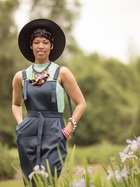
Before being diagnosed with gastric cancer at the age of 26, Derrian had suffered from chronic stomach pain as well as other symptoms, including acid reflux and nausea. After misdiagnoses of gastritis and ulcers, she met with a gastroenterologist who diagnosed her with stage 3 stomach cancer in September 2017.
Within days of receiving her diagnosis, Derrian began a treatment of radiation and chemotherapy. Earlier this year, she also underwent a partial gastrectomy (surgical removal of a part the stomach) and additional chemotherapy.
During her experience with cancer, Derrian relied heavily on the people around her, who offered their prayers, words of encouragement, quality time and donations. In her own words, Derrian’s friends and family “have truly been the hands and feet of Christ, meaning that they have displayed an abundance of selflessness through every action taken to see me through this challenge.”
Derrian first came to CancerCare after a recommendation from a family member’s co-worker, who had previously used CancerCares services. Once connected with CancerCare, Derrian was able to find both financial and emotional support through different programs. She shares, “CancerCare provided a comfortable, safe space where I let myself become vulnerable, and I am so grateful for that, because with openness comes growth.”
CancerCare provided Derrian with a transportation grant through the Financial Assistance Program, which helped her to more easily get to and from treatments.
Derrian also joined the Young Adults with Cancer online support group, where she found support from others who were going through similar experiences. “Despite having a wonderful support system of family and friends, it is always refreshing to discuss things with people who have been or are currently in your position,” says Derrian.
In this online support group, Derrian was able to connect with people around her age who were also coping with cancer and who were able to provide unique perspectives on life.
Derrian recalls, “My hurdles ultimately created a new mindset within which I dispelled fear and doubt. Through a combination of many people’s efforts, faith and optimism, I reached a greater level of confidence and gratitude.”
To anyone going through a similar situation, Derrian offers this advice: “It’s okay to be vulnerable. It’s okay to depend on someone else. Make an active choice to seek counseling and remove the stigma surrounding mental health. Also, being dependent upon others does not equate to weakness. Self-awareness, relationships and new opportunities are created and fortified through transparency. However, it doesn’t mean you’re incapable of living a normal life.”
